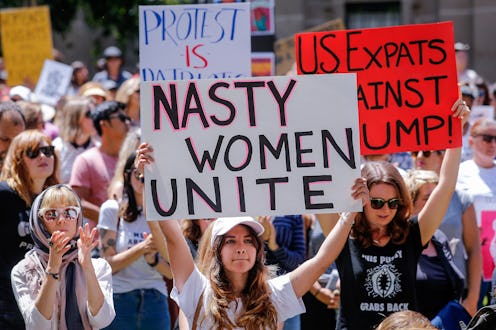News
Should Expat Women Fight Trump Or Just Pretend He Doesn't Exist? Here's What They Think

Alison Haywood was recently caught off guard when a German paramedic asked what she, an expat, thought of Donald Trump while transporting her to the hospital after a minor bicycle accident. The 25-year-old currently lives in Hamburg, Germany, where she says locals constantly ask her opinion on U.S. politics.
"There is a time and a place to talk politics, and it is not when I’m lying on a stretcher with a neck brace," Haywood, who works in online marketing, tells Bustle.
The first 14 months of Trump's presidency were a whirlwind, to say the least, for anyone following American politics. On any given day, a handful of White House staffers could be fired; special counsel Robert Mueller could subpoena another former Trump adviser; or a tweet from the president could spark an international incident. This constant political turmoil has created a dilemma for many American expats who feel torn about living abroad when there's so much conflict building back in the states.
Having an ocean between them and Trump makes it fairly easy for expats troubled by his administration to distance themselves from the 24-hour news cycle that largely centers around the White House. At the same time, they must juggle that separation with the knowledge that whatever happens in the United States will affect their friends and family. There are ways to advocate for the causes they care about from afar, but in conversations with Bustle, these expats say they feel like they're missing out on the major political movements happening back home.
"It’s both a relief to be here in the U.K., but also there’s just this longing sadness for the U.S.," says Audrey Davis, a 31-year-old creative director who moved to London last June.
Davis lost a close friend to gun violence in November, when the Atlanta restaurant the friend worked in was robbed at gunpoint. Not only does Davis think her friend would still be alive if she worked at a restaurant in the United Kingdom, where handguns were banned after that nation's first and only school shooting in 1996, but she also wishes she could have advocated for her friend at the national March for Our Lives last month in Washington, D.C.
"That would have been an incredible thing to be a part of," she says. Davis felt like she missed out on this year's Women's March, too. Although there was a small demonstration in London, Davis says she feels like it doesn’t quite count to protest the American government from across the Atlantic.
Charlotte Johnson finds herself in a similar position. Before embarking on an extended sabbatical from her communications career at the end of 2017, the 27-year-old attended a Women's March in Dallas, protested Trump's travel ban, and was constantly plugged into the news. However, her activism came to a screeching halt during her first few months abroad.
"I found it was surprisingly easy to check out," she tells Bustle. "I didn't listen to the news anymore, I didn't really engage that much. It felt like a form of self-care, but at the same time I felt kind of guilty."
Now, she's trying to find a balance, despite being a whole day ahead of the United States while living in New Zealand. She plans to get back in the habit of reading the news (though probably not all day, every day), sign petitions, and support the causes she's most passionate about, including reproductive rights and gun control.
Remaining politically active while living abroad requires exactly that: balance. Davis listens to political podcasts every morning and used her birthday in February to raise money for Planned Parenthood on Facebook. She raised nearly 200 pounds ($280), but she says her main goal was to bring people's attention to the organization, which was at risk of losing federal funding last year.
While Davis and Johnson are fairly new to the expat life, Haywood is a comparatively seasoned veteran, having lived abroad for four years. Still, she says she was furious about the 2016 election results and attended an Inauguration Day protest in Hamburg.
"We knew it wasn’t going to do anything," Haywood says of the protesters. "[But] I felt like that was my duty."
Haywood says her political engagement has been somewhat limited since then, with the exception of writing her congressman, Rep. Dave Reichert (R-WA), asking him to oppose the travel ban.
Davis, Johnson, and Haywood have all stayed somewhat engaged with what's happening in the states. But they also say it's cathartic to keep some mental distance while living in another country.
"My anxiety level for the news has gone down," Davis says. "That’s the wonderful thing about it."
In many ways, expats face the same problems as anyone concerned about the future of America. It's exhausting to constantly think about what's happening in Washington and who the president's latest tweet offended. Being abroad can make it easy to simply ignore what's happening back home, but these expats say they do feel a duty to help their fellow citizens in some way. That's the paradox created by the Trump presidency: while the constant chaos makes the grass outside the United States look even greener, it's simultaneously impossible for expats to ignore the reality facing their loved ones back home.